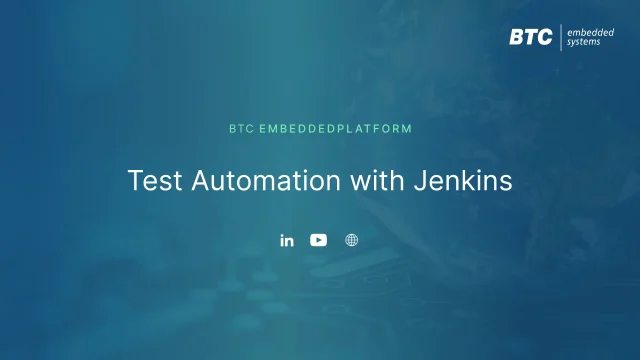Play now

播放视频
Play now

播放视频

Include unit and integration tests in your CI pipeline to ensure high quality early on!
Embedded software for automotive applications has always had longer development cycles than web or desktop development. This is to be expected, due to various hardware dependencies, the safety-critical nature of the work, and the overall complexity involved. But new challenges, like the ongoing digitalization of the car, demand faster development cycle times and an openness to change, without sacrificing the same ambitious quality goals that have come to characterize the automotive world.
Continuous Integration and Continuous Deployment (CI/CD) pipelines are a key factor for early integration of modules and components, as they enable fast feedback on product quality, even while it’s being actively developed. With a suitable CI/CD pipeline and a solid test strategy, adding new features or maintaining existing software functions becomes less of a risk, allowing for faster and more confident development decisions.


This includes running:
For some popular environments, like Jenkins, we provide easy-to-use, first-class pipeline integration plugins. But our powerful REST API provides the flexibility to integrate your testing workflowinto any environment, like GitHub Actions, GitLab CI/CD, Bitbucket Pipelines or Pipelines in Azure DevOps.
As “the leading open source automation server” (jenkins.io), Jenkins is everywhere. Many of our customers already have a well-established software delivery pipeline to automatically bring their embedded software from commit to deliverable.
If you want to test your model- or hand-code-based software components, all you have to do is specify the well-documented BTC EmbeddedPlatform test steps you’d like taken in your Pipeline. The btc-embeddedplatform plugin (available in the Jenkins plugin manager) will take it from there.


Jenkins is big in automotive software development, but it’s certainly not the only player when it comes to CI/CD. Users of modern git services and platforms like GitHub, GitLab or Bitbucket like to set up Pipelines directly on those platforms. Solutions like GitHub Actions, GitLab CI/CD, Bitbucket Pipelines or Pipelines in Azure DevOps are tightly coupled with the git repository and provide a single point of entry for many related actions.
In case we don’t offer an off-the-shelf integration with the platform that you are using, our versatile REST API can be used to automate a test workflow from any scripting or programming language. We provide on-demand examples for most environments (e.g., Python, Javascript, …).

Additionally, our REST API is built on the OpenAPI standard. For a more advanced integration, you can build your own SDK with an API client for many popular languages, like Java, Kotlin, Node, Ruby or Typescript. For the full list of supported API clients, check out the OpenAPI Generator project.
A classic, distributed CI/CD setup works with agents or self-hosted runners to carry out the main workload of your pipelines. These are usually virtual machines with an operating system and all the required tools (build tools, test tools, etc.).
With more companies embracing the benefits of the cloud, we see a shift from preconfigured self-hosted machines to cloud resources. Due to their pay-per-use nature, these resources are instantiated on-demand and discarded after use, to minimize cost.
Container technologies like Docker allow us to leverage the numerous advantages of cloud-computing, like scalability and consistent environment reproduction, while keeping costs under control.
BTC EmbeddedPlatform is also available as a Linux-based container image, so that test workflows can be automated with no manual install necessary.

您有任何问题或希望看到我们的工具在实际项目中运行吗?如果是这样,请使用下面的链接安排会议,我们的工程团队成员将很乐意向您展示功能和用例,并直接回答您可能遇到的任何问题。

Thabo Krick
Oldenburg, Germany

Thabo Krick
Oldenburg, Germany
Smart test generation for an ISO 26262 certified and fully automated Back-to-Back Test
Copyright © 2024 BTC Embedded Systems